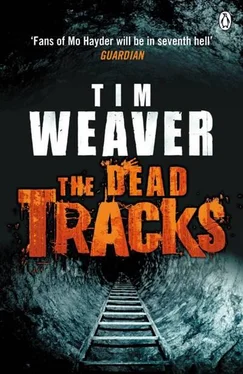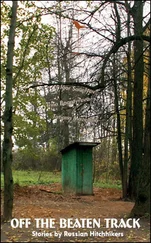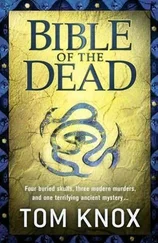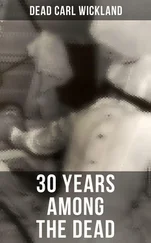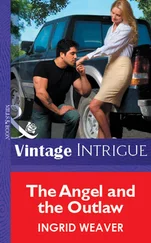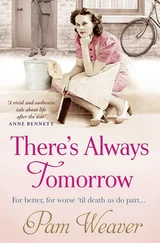The Dead Tracks
Tim Weaver

For Mum and Dad
'All faces shall gather blackness…'
Joel 2:6
PART ONE
Chapter One
We met in a restaurant on the Thames called Boneacres. They were sitting in a booth at the back. Rain was running down the windows and both of them were staring out at a queue of people waiting in line for the Eye. The woman looked up first. Caroline Carver. She'd been crying. The whites of her eyes were stained red, and some of her makeup had run. She was slim and well dressed, in her mid forties, but didn't wear it well: there were lines in her face — thick and dark like oil paint - that looked as if they'd been carved with a scalpel, and though she smiled as I approached, it wasn't warm. She'd been past warm. Most of the parents I dealt with were like that. The longer their kids were missing, the colder their lives became.
She slid out from the booth and we both shook hands, then she made way for her husband. James Carver. He was huge; a bear of a man. He didn't get up, just reached across the table and swallowed my hand in his. I knew a little about them already, mostly from Caroline's initial phone call a couple of days before. She'd told me they lived in an old church — converted into a four-bedroom home — from which he ran his building firm, a business he'd built up over fifteen years. Judging by the property's two-million-pound price tag, the name brands they were sporting and some of his celebrity clients, it was keeping them pretty comfortable.
He smiled at me, more genuine than his wife, and gestured to the other side of the booth. I slid in. The menu was open. The restaurant had been their suggestion, and when I looked at the prices, I was glad they were paying.
'Thanks for coming,' Carver said.
I nodded. 'It seems like a nice place.'
Both of them looked around, as if they hadn't thought about it before. Carver smiled. Caroline's eyes snapped back to the menu.
'We used to come in here before we were married,' he said. 'Back when it was a steak and seafood place.' His wife glanced at him, and he reached over and took her hand. 'Caroline tells me you used to be a journalist.'
'Once upon a time.'
'Must have been interesting.'
'Yeah, it was fun.'
He glanced at my left hand. Two of my fingernails were sunken and cracked, a blob of white scarring prominent in the centre where the veneer would never grow back.
Those your battle scars?' he asked.
I glanced at the nails. 'No. They got added more recently.'
'So why did you give it all up?'
I looked at him, then across to Caroline. 'My wife was dying.'
A real conversation stopper. They shifted uncomfortably. Caroline turned her gaze back to the table, then picked up her menu. He cleared his throat. Before the silence got too long, Carver reached into his jacket and brought out a photograph. Something moved in his eyes, a sadness, and then he turned it around and placed it in front of me.
'That's Megan,' he said.
When Caroline had originally called, I gave her directions to the office - but she said she wanted to meet somewhere neutral, as if coming to see me was confirmation her daughter was gone for good. After we'd arranged a time and a place, she told me a little about Megan: a good girl, part of a close family, no boyfriends, no reason to leave.
She'd been gone nearly seven months.
Two hundred thousand people go missing in the UK each year — thirty thousand in London alone — but the most powerful media story of them all is the young white female from a middle-class, two-parent family. When Megan first disappeared, there was a lot of media coverage: locally, nationally, some of it even playing out abroad. It ran for weeks, one headline after the next, every TV channel in the country reporting from outside the gates of her home. There was a name for cases like hers that unravelled in the full glare of the camera lens: MWWS.
Missing White Woman Syndrome.
In the photograph they'd handed me, Megan was sitting with her mum on a beach. The sand was white, flecked with small stones and twigs and falling away to a sapphire sea. Behind Caroline and Megan, playing, was a small boy, probably four years old. He was half turned to the camera, his eyes looking into the hole he was digging.
Carver pointed at the boy. That's our son. Leigh.' He looked at me and could see what I was thinking: there was a thirteen-year age gap between their kids. 'I guess you could say…' He glanced at his wife. 'Leigh was a very pleasant surprise.'
'How old is the photograph?'
'About eight months.'
'Just before she disappeared?'
'Yes, our last holiday together, in Florida.'
Megan was very much her father's daughter. She had the same face, right down to identical creases next to the eyes, and was built like him too. Big, but not fat. She was an attractive seventeen-year-old girl: long blonde hair, beautifully kept, and olive skin that had browned appealingly in the sun.
'Tell me what happened the day she went missing.'
Both of them nodded but made no move to start. They knew this was where it began; the pain of scooping up memories, of going over old ground, of talking about their daughter in the past tense. I got out a pad and a pen as a gentle nudge. Carver turned to his wife, but she gestured for him to tell the story.
'I'm not sure there's a lot to it,' he said finally. His voice was unsteady at first, but he began to find more rhythm. 'We dropped Meg off at school, and when we went to pick her up again later, she didn't come back out.'
'Did she seem okay when you dropped her off that morning?'
'Yes.'
'Nothing was up?'
He shook his head. 'No.'
'Megan didn't have a boyfriend at the time, is that right?'
'That's right,' Caroline said sharply.
Carver looked at his wife, then squeezed her hand. 'Not one that she told us about. That doesn’t mean there wasn't one.'
'Did she have any boyfriends before then?'
'A couple,' Caroline said, 'but nothing serious.'
'Did you meet them?'
'Briefly. But she used to say that when she finally brought a boy home for longer than a few minutes, we'd know it was the real thing' She attempted a smile. 'Hopefully we'll still get to see that day.'
I paused for a moment while Carver shifted up the booth and slid his arm around his wife. He looked into her eyes, and back to me.
'She never expressed a need to travel or leave London?' I asked.
Carver shook his head. 'Not unless you count university.'
'What about her friends - have you spoken to them?'
'Not personally. The police did that in the weeks after she disappeared.'
'No one knew anything?'
'No.'
I picked up the pen. 'I'll take the names and addresses of her closest friends, anyway. It'll be worth seeing them a second time.'
Caroline reached down to her handbag, opened it and brought out a green address book, small enough to slip into a jacket pocket. She handed it to me.
'All the addresses you need will be in there, including her school,' she said. That's Meg's book. She used to call it her Book of Life. Names, numbers, notes.'
I nodded my thanks and took it from her. What sort of stage would you say you're at with the police?'
‘We're not really at a stage. We speak to them once a fortnight.' Carver stopped, shrugged. He glanced at his wife. 'To start with we made a lot of headway in a short space of time. The police told us they had some good leads. I guess we got our hopes up.'
'Did they tell you what leads they had?'
Читать дальше
